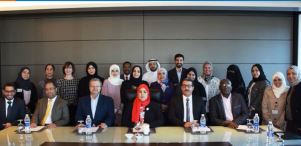 13 December 2016 – Surveillance officers and data managers from ministries of health of the 6 member countries of the Gulf Cooperation Council (GCC) gathered for a 3-day workshop in Bahrain from 12 to 14 December 2016 to build their capacity on risk assessment associated with population movements and mapping high-risk groups and locations. They were also informed of the new updated AFP surveillance guidelines.
13 December 2016 – Surveillance officers and data managers from ministries of health of the 6 member countries of the Gulf Cooperation Council (GCC) gathered for a 3-day workshop in Bahrain from 12 to 14 December 2016 to build their capacity on risk assessment associated with population movements and mapping high-risk groups and locations. They were also informed of the new updated AFP surveillance guidelines.
Director of Public Health of Bahrain Dr Mariam Al Hajeri delivered opening remarks on behalf of Her Excellency Minister of Health of the Kingdom of Bahrain in which she made reference to the close cooperation between GCC countries and WHO in the area of health, in general, and polio eradication efforts, in particular. She also emphasized the importance of the recent activities on the switch from trivalent oral polio vaccine to bivalent which have been successfully completed.
GCC countries have been polio free since 1990s thanks to strong routine immunization systems complemented with polio supplementary vaccination activities. Although no countries have been assessed to be at high risk following a detailed risk analysis conducted by the WHO regional polio programme due to high immunity profiles and strong surveillance system, population movement, including the movement of migrant workers from polio-endemic countries, still poses a risk of probable importation of various poliovirus, especially vaccine-derived polio virus type 2.
The workshop is designed to be interactive with case studies and hands-on exercises. Data sets of all 6 GCC countries will also be upgraded to enable them to maintain databases to enhance monitoring and evaluation.
2 subregional workshops on risk assessment and mapping high priority areas for 14 countries and another for the rest of the Region will be completed in early 2017.




